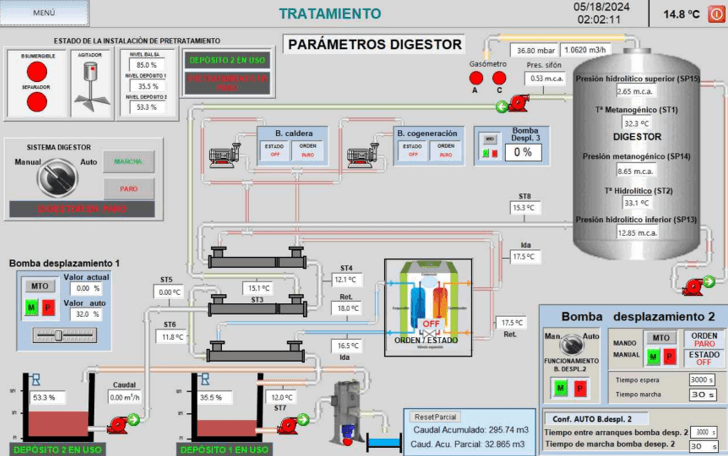
SCADA system allegedly controlling the Digestor Tank operations of Gijón’s Bio-Energy Plant
The cybersecurity landscape is witnessing an alarming trend as ransomware groups increasingly set their sights on industrial control systems (ICS), the digital backbone of essential infrastructure. A recent attack by the Ransomhub ransomware gang on a Spanish bioenergy plant, meticulously analyzed by Cyble Research & Intelligence Labs (CRIL), has amplified concerns about the vulnerability of these critical systems.

The attack in question involved the Supervisory Control and Data Acquisition (SCADA) system of the Spanish Abattoir, Matadero de Gijón. Given the company’s reliance on ICS for production and other operational requirements, this breach highlights the vulnerabilities inherent in such environments. Ransomhub claimed to have encrypted and exfiltrated over 400 GB of data, gaining access to critical components of the biogas plant, including the Digestor controls and Heating system. The ransomware group demonstrated persistence in these systems as recently as May 18, 2024.
Ransomhub emerged as a Ransomware-as-a-Service (RaaS) in February 2024, introduced by a user named TA koley on the cybercrime forum RAMP. The malware, written in Golang and C++, is obfuscated using complex encryption algorithms such as aes256, chacha20, and xchacha20, ensuring rapid and secure encryption. The RaaS notably restricts attacks on organizations in CIS countries, Cuba, North Korea, and China, reflecting a pro-Russian ideology.
Since its inception, Ransomhub has claimed attacks on 68 organizations, primarily targeting the IT & ITES sector and entities within the United States. The group has been proactive in recruiting affiliates, notably attempting to poach from ALPHV/BlackCat following their exit scam in March 2024. This strategy was evident when Ransomhub briefly listed ALPHV/BlackCat’s former targets on its leak site, which were later removed and appeared on LOCKBIT’s site, indicating challenges in attracting affiliates.
CRIL’s analysis also reveals Ransomhub’s connections with prominent Initial Access Brokers (IABs) on Russian-language forums, suggesting that the group often buys compromised access to infiltrate victims’ networks.
The recent attack on SCADA systems serves as a critical reminder of the vulnerabilities within ICS environments, especially those exposed to the internet. CRIL has consistently highlighted the security challenges of internet-exposed ICS assets, emphasizing the need for robust cybersecurity measures. This incident amplifies the urgency for organizations to reassess their cybersecurity strategies to protect critical infrastructure from sophisticated cyber threats.